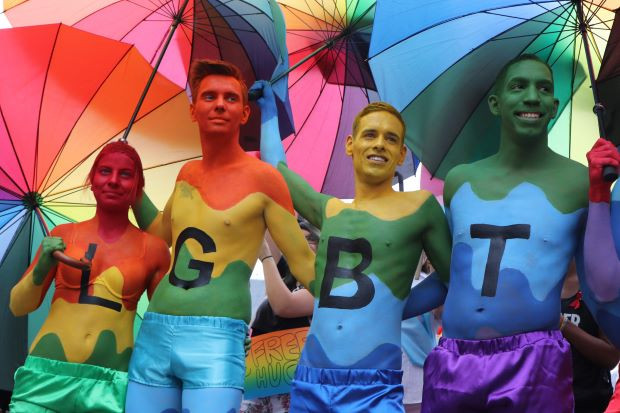Research: Contributors of Economic Exclusion
In this research, Nafas LGBT Azerbaijan Alliance touches on the factors that affect the emergence of the existing incentive environment and what reforms and reductions are needed in their elimination.
27/Feb/19
7466
Research: Contributors of Economic Exclusion
Discrimination against LGBTI people is more widespread and socially accepted than virtually any other kind of discrimination in Azerbaijan. The Williams Institute’s “Global Acceptance Index (GAI)” shows that Azerbaijan has a lowest score on social acceptance of LGBTI people among the 141 countries around the world – 0.96 of 10. Because of the oppressive social construction of gender and related norms the economic potential of LGBTI people is also limited by exclusion from the workplace and economic advantages. Discrimination against sexual and gender minorities also has clear impacts on their families, such as when entire households suffer due to the presence of a single family member who is seen as part of a sexual or gender minority. In this research, Nafas LGBT Azerbaijan Alliance touches on the factors that affect the emergence of the existing incentive environment and what reforms and reductions are needed in their elimination.
Education factor
Sexual and gender minorities and other gender nonconforming children, youth are disproportionately bullied at school by fellow students and even by teachers. Such bullying is in turn associated with poorer academic performance and higher drop-out rates. Taking into account the close relationship between academic performance, qualifications and lifetime earnings, these phenomena almost certainly contribute to lower average earnings. Consecutively, there occurs to be this cyclical dynamic where gay, lesbian, bisexual, transgender and intersex people with lower socioeconomic status and educational levels are more vulnerable to social stigma and discrimination and in turn are less able to access economic opportunities.
Work climate factor
LGBTI people face two kinds of discrimination: exclusion when seeking to enter into the workplace (1), once on the job, LGBTI people face harassment and few opportunities for advancement (2). On average, LGBTI people earn less than heterosexual, cisgender people and are more likely to be living in poverty. The earnings penalty is greater for gay men than for lesbians and by far the most severe for transgender people. According to the results of the survey conducted in 2013 by Nafas LGBT Azerbaijan Alliance and encompassed such fields, as tourism, bank, trade malls, and included 500 respondents, we can infer that climate of business in Azerbaijan is not LGBTI friendly. 64% of respondents don’t want to work with LGBTI person together and overall, 60% has a negative attitude towards them, 60% of respondents wouldn't hire an LGBTI person if he/she was an employer. Research found out that most participants were not ‘out’ at their workplace because they feared verbal abuse or violence. Those who were ‘out’ often faced severe discrimination as well as actual job termination, threats of violence, homophobic jokes and reported being described as ‘perverts’.
Secret in workplace
LGBTIs may disguise their true orientation and identity and pass as heterosexuals in order to avoid discrimination or harassment. Disclosure of sexual orientation is not a matter of ‘once and for all’ but is rather a continuous process. It is important to note that the indicators of perceived discrimination would be much higher, and the number of incidents with discrimination in the workplace (unlawful dismissals, refusals to promote) would be significantly greater if many employees did not hide their sexual orientation or gender identity. This fear, as well as the obsession with silence about their sexual orientation and gender identity is often stressful and may have a negative impact on the individual’s productivity, self-esteem, depth of friendships, and ability to work as part of a team.
Military factor
Based on the evidence, another main problem occurs during the conscription military process that has a huge influence on having access to economic opportunities. Every male homosexual, who was outed about his sexual orientation, are directed to psychological dispensary with diagnosing 18B (affective retentions, mid-level personality disorders easily caused reactive phases, appearing as signs of instability of vegetative nerve system, psychopathy, pathological development of identity). Later this occurs in their certificate of military service that makes their access to legal labor market impossible. In practice every male citizen being asked for that certificate by employers.

Legislation factor
Target 8.8 appoints that state has to protect labor rights, promote safe and secure working environments for all workers. Article 16 of Labor Code of the Republic of Azerbaijan prohibits discrimination on several grounds; however, no explicit prohibition of the discrimination on the grounds of SOGIESC has hitherto been added to the Labor Code.
The absence of legal gender recognition is a barrier to transgender and intersex persons having effective access to labor market. The resulting mismatch between the gender identity and expression being different to the sex/gender marker on their identity documents can create mistrust among potential employers, as well as focusing attention on the candidate’s gender identity and expression rather than their suitability for a job.
The evidences in general indicate that hiding one’s sexual orientation at work appears to be linked to a number of negative working life outcomes. If discriminated against or harassed, many LGBT do not dare to take action, often out of the fear of being disclosed or because they do not believe that authorities and legal procedures would offer help. This contributes to the apparent invisibility of LGBTI community and its problems in the workplace.
LEAVING NO ONE BEHIND
State’s economic development policies will be more effective if they are inclusive for LGBTI people. Elimination of violence, stigma and discrimination against LGBTI people in work space removes barriers to full participation in the economy, and gives LGBTI people the opportunity to realize their full potential and be become a contributor to the economic growth. How to achieve progress and full-productive employment without leaving anyone behind? The most effective ways to accelerate the progress toward SDG 8:
Ensure an adequate budget to conduct awareness – raising programs for broader society to prevent discrimination and societal stigma against all disadvantaged or marginalized individuals or groups, including LGBTI citizens in relation to employment;
Take the necessary legislative and administrative measures toward gender recognition in line with international best practice, to ensure that transgender and intersex persons have effective access to employment;
Build effective strategies, policies that applies broadly to all areas and dimensions of employment to ensure that LGBTI people are not being discriminated against when it comes to hiring, retaining and promoting employees in both, public and private sectors;
Improve data collection disaggregated by sexual orientation, gender identity, gender expression and characteristics related to income, existence and utilization of workplace protections against discrimination and associations between sexual and gender minority inclusion and economic growth;
Consult and cooperate with civil society organizations that working with or for the involvement of LGBTI people in to the process, to make sure that their needs are accounted;
Agenda 2030 is calling!
Nafas LGBT Azerbaijan Alliance believes that if one of them is not met, the other SDGs cannot be reached. A key target related to the first sustainable development goal is to ensure “that all men and women, in particular, the poor and the vulnerable, have equal rights to economic resources, as well as access to basic services.” All the other SDGs contribute to the achievement of SDG 1 but the particular relevance of SDG 8 is prominent for LGBTI people. Sustained, inclusive and sustainable economic growth, full and productive employment and decent work for all (SDG 8) needs enhanced policy coherence (Target 17.14) and; promoted and enforced non-discriminatory laws and policies for sustainable development (Target 16.B) that in result eradicates extreme poverty for all people everywhere (Target 1.1), ensures that all [..], in particular the poor and the vulnerable, have equal rights to economic resources, [..] (Target 1.4), by 2030 ends the hunger [...] (Target 2.1), ends all forms of discrimination [...] everywhere (Target 5.1) and ensures the access for all to adequate, safe and affordable housing and basic services [...] (Target 11.1).



